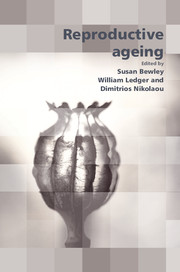Book contents
- Frontmatter
- Contents
- Participants
- Declarations of personal interest
- Preface
- SECTION 1 BACKGROUND TO AGEING AND DEMOGRAPHICS
- SECTION 2 BASIC SCIENCE OF REPRODUCTIVE AGEING
- SECTION 3 PREGNANCY: THE AGEING MOTHER AND MEDICAL NEEDS
- SECTION 4 THE OUTCOMES: CHILDREN AND MOTHERS
- SECTION 5 FUTURE FERTILITY INSURANCE: SCREENING, CRYOPRESERVATION OR EGG DONORS?
- SECTION 6 SEX BEYOND AND AFTER FERTILITY
- SECTION 7 REPRODUCTIVE AGEING AND THE RCOG: AN INTERNATIONAL COLLEGE
- SECTION 8 FERTILITY TREATMENT: SCIENCE AND REALITY – THE NHS AND THE MARKET
- 28 Evidence-based and cost-effective fertility investigation and treatment of older women: moving beyond NICE
- 29 Bang for the buck: what purchasers and commissioners think and do
- 30 Fertility treatment: science and reality – the NHS and the market
- SECTION 9 THE FUTURE: DREAMS AND WAKING UP
- SECTION 10 CONSENSUS VIEWS
- Index
29 - Bang for the buck: what purchasers and commissioners think and do
from SECTION 8 - FERTILITY TREATMENT: SCIENCE AND REALITY – THE NHS AND THE MARKET
Published online by Cambridge University Press: 05 February 2014
- Frontmatter
- Contents
- Participants
- Declarations of personal interest
- Preface
- SECTION 1 BACKGROUND TO AGEING AND DEMOGRAPHICS
- SECTION 2 BASIC SCIENCE OF REPRODUCTIVE AGEING
- SECTION 3 PREGNANCY: THE AGEING MOTHER AND MEDICAL NEEDS
- SECTION 4 THE OUTCOMES: CHILDREN AND MOTHERS
- SECTION 5 FUTURE FERTILITY INSURANCE: SCREENING, CRYOPRESERVATION OR EGG DONORS?
- SECTION 6 SEX BEYOND AND AFTER FERTILITY
- SECTION 7 REPRODUCTIVE AGEING AND THE RCOG: AN INTERNATIONAL COLLEGE
- SECTION 8 FERTILITY TREATMENT: SCIENCE AND REALITY – THE NHS AND THE MARKET
- 28 Evidence-based and cost-effective fertility investigation and treatment of older women: moving beyond NICE
- 29 Bang for the buck: what purchasers and commissioners think and do
- 30 Fertility treatment: science and reality – the NHS and the market
- SECTION 9 THE FUTURE: DREAMS AND WAKING UP
- SECTION 10 CONSENSUS VIEWS
- Index
Summary
Introduction
It is perhaps a little premature to comment in depth on the mindset and motivations of healthcare commissioners in the area of infertility. Department of Health research continues into which assisted reproductive technology (ART) services are being bought by the primary care trusts (PCTs), which problems they are facing and what their longer-term intentions are. This will be coupled with support work to help them to improve commissioning for those who have problems conceiving. This work is being led by Infertility Network UK (INUK), the leading patient voice in infertility, together with a group of other experts guiding the Department of Health on particular aspects of infertility care.
Evidence-based precision on the nature of what goes on in the commissioner's mind is difficult to achieve, partly because there is no such thing as a ‘typical’ commissioner. The work of the expert group advising ministers on how to improve uptake of the National Institute for Health and Clinical Excellence (NICE) fertility guideline1 may shed some clear light on this when it reports in the summer of 2009. Meanwhile, everything we can say on the matter is necessarily rather anecdotal and speculative but this chapter is based on a lengthy observation of PCTs' reaction to spending on subfertility. There are some definite trends in commissioning behaviour that are helpful to observe.
Keywords
- Type
- Chapter
- Information
- Reproductive Ageing , pp. 303 - 312Publisher: Cambridge University PressPrint publication year: 2009



